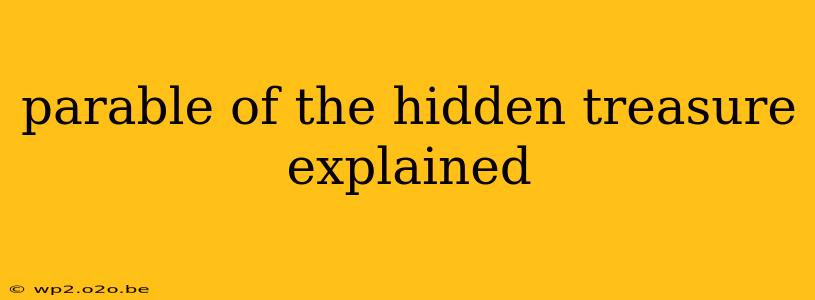The Parable of the Hidden Treasure, found in Matthew 13:44, is a powerful illustration of the transformative power of encountering the Kingdom of God. More than just a simple story, it speaks to the inherent value of faith and the radical changes it can bring about in a person's life. This in-depth analysis will explore the parable's meaning, its context within the broader Gospel message, and its enduring relevance for believers today.
Understanding the Parable
The parable itself is concise and evocative: "The kingdom of heaven is like treasure hidden in a field, which a man found and hid; then in his joy he goes and sells all that he has and buys that field." (Matthew 13:44, ESV).
The simplicity of the narrative belies its profound message. The key elements are:
-
The Hidden Treasure: This represents the Kingdom of God, something of immense and unexpected value. It's not something easily discovered; it requires diligence, perhaps even a degree of accidental finding. This reflects the often-unforeseen nature of encountering faith and its life-altering effects.
-
The Man Who Finds It: This individual represents anyone who encounters the Kingdom of God. It isn't necessarily someone actively searching, but rather someone open to the possibility.
-
The Joyful Sacrifice: Upon discovering the treasure, the man's immediate reaction is overwhelming joy. This joy motivates him to make a significant sacrifice – selling everything he owns – to acquire the field containing the treasure. This speaks to the all-consuming nature of faith and its ability to reshape priorities.
-
The Acquisition of the Field: The man doesn't just take the treasure; he buys the entire field, signifying a complete commitment and embrace of the Kingdom. This isn't a partial commitment, but a total surrender.
Context and Interpretation
Within the broader context of Matthew's Gospel, the Parable of the Hidden Treasure sits alongside other parables of the Kingdom. These parables collectively illustrate the Kingdom's surprising nature, its inherent value, and the necessary response it demands from those who encounter it. The unexpected discovery of the treasure mirrors the unexpected nature of God's grace and the transformative power of faith. The man's selfless act of selling all he possesses highlights the radical commitment required to follow Christ.
Relevance for Today
The parable's message continues to resonate with believers today. In a world often preoccupied with material possessions and fleeting pleasures, the parable serves as a stark reminder of the ultimate value of a relationship with God. It encourages us to:
-
Seek the Kingdom First: The parable emphasizes the Kingdom of God as the ultimate treasure, surpassing all earthly possessions and ambitions. This calls for a re-evaluation of priorities, placing faith and spiritual growth above material pursuits.
-
Embrace Radical Commitment: The man's willingness to sacrifice everything highlights the transformative power of faith. True commitment to Christ often requires significant sacrifices, but the reward far outweighs the cost.
-
Experience the Joy of Salvation: The overwhelming joy experienced by the man upon finding the treasure underscores the deep satisfaction and fulfillment found in a relationship with God. This joy is not a fleeting emotion, but a lasting source of peace and hope.
Conclusion
The Parable of the Hidden Treasure is more than a simple story; it's a powerful metaphor for the transformative power of faith. It challenges us to reassess our priorities, embrace radical commitment, and discover the ultimate treasure – a relationship with God – that surpasses all earthly possessions. Its enduring relevance lies in its ability to inspire and challenge believers to live lives fully surrendered to the Kingdom of Heaven.

